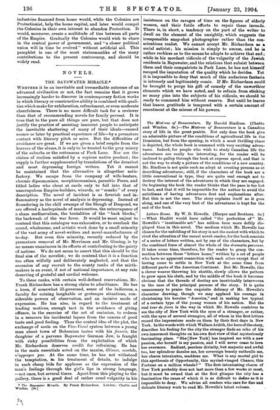WHETHER it be an inevitable and irremediable outcome of an
advanced civilisation or not, the fact remains that it grows
increasingly harder to discover in contemporary fiction works in which literary or constructive ability is combined with quali- ties which make for exhilaration, refreshment, or even moderate cheerfulness. There is no more difficult task for a reviewer than that of recommending novels for family perusal. It is true that to the pure all things are pure, but that does not justify the practice of assisting innocent people to anticipate the inevitable shattering of many of their ideals—caused sooner or later by practical experience of life—by a premature contact with literary pitch or mire. But the difficulties of avoidance are great. If we are given a brief respite from the horrors of the slums, it is only to be treated to the grey misery of the suburbs or the rottenness of Park Lane. Nor are the claims of realism satisfied by a copious native product ; the supply is further supplemented by translations of the dreariest and most depressing foreign writers. Yet it cannot be maintained that the alternative is altogether satis- factory. We escape from the company of wife-beaters, chronic dipsomaniacs, morphinomaniacs, parasitic Peers, and titled ladies who cheat at cards only to fall into that of unscrupulous Empire-builders, wizards, or " cranks " of every description. The novel of incident is as feverish and in- flammatory as the novel of analysis is depressing. Instead of floundering in the chill swamps of the Slough of Despond, we are offered a harlequinade of marionettes, the extravagance of a sham mediaevalism, the brutalities of the "back blocks," the backwash of the war fever. It would be most unjust to contend that this catalogue was exhaustive, or to overlook the sound, wholesome, and artistic work done by a small minority of the vast army of novel-writers and novel-manufacturers of to-day. But even this minority, recently reduced by the premature removal of Mr. Merriman and Mr. Gissing, is by no means unanimous in its efforts at contributing to the gaiety of nations. We do not mean to assert that this should be the final aim of the novelist ; we do contend that it is a function too often wilfully and deliberately neglected, and that the =cession of any recruit to the scanty ranks of the mirth- makers is an event, if not of national importance, at any rate deserving of grateful and cordial welcome.
To these ranks, with certain well-defined reservations, Mr. Frank Richardson has a strong claim to admittance. He has a keen, if somewhat ill-governed, sense of the ludicrous, a faculty for coining laughable or grotesque situations, con- siderable powers of observation, and an incisive mode of expression. He has also, in regard to the treatment of leading motives, enough tact in the avoidance of giving offence, in the exercise of the art of omission, to redeem in a measure his incidental lapses from the canons of good taste and good feeling. Thus the central idea of the plot, the exchange of souls on the Vice-Versd, system between a young man about town of Bohemian tastes with his fiancée, the daughter of a parvenu Bayswater German Jew, is fraught with risky possibilities from the exploitation of which Mr. Richardson deserves credit for refraining. He has in the main essentials acted on the maxim, Glissez, ?aortas, ol'appuyez pas. At the same time, he has not withstood the temptation, m his treatment of details, to indulge in such cheap bids for applause as the expression of the man's feelings through the girl's lips in strong language, —not once, but several times. Apart from this playing to the gallery, there is a good deal of rather cruel vulgarity in his • The Bayswater Miracle. By Frank Richardson. London Chatto and Windua. De] insistence on the ravages of time on the figures of elderly women, and their futile efforts to repair these inroads. There is, in short, a tendency on the part of the writer to dwell on the element of the unsightly, which suggests the irresponsible snap-shot photographer rather than the con- scientious realist. We cannot accept Mr. Richardson as a social satirist ; his mission is simply to amuse, and he is rather reckless as to the means he adopts to achieve that end ; while in his mordant ridicule of the vulgarity of the Jewish residents in Bayswater, and the relations that subsist between them and their compatriots in Park Lane, he has not himself escaped the imputation of the quality which he derides. Yet it is impossible to deny that much of this audacious fantasia is intensely and legitimately comic. If Mr. Richardson could be brought to purge his gift of comedy of the unworthier elements which we have noted, and to refrain from sticking so many pins into the subjects of his ridicule, we should be ready to commend him without reserve. But until he learns that lesson gratitude is tempered with a certain amount of resentment at the misuse of his powers.










































 Previous page
Previous page